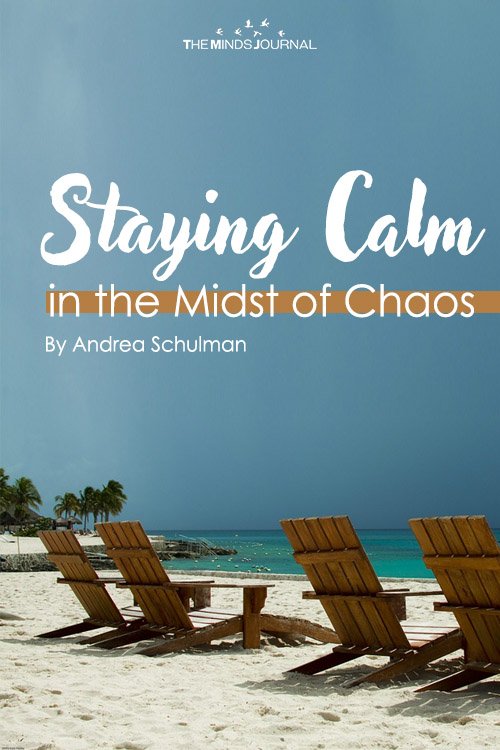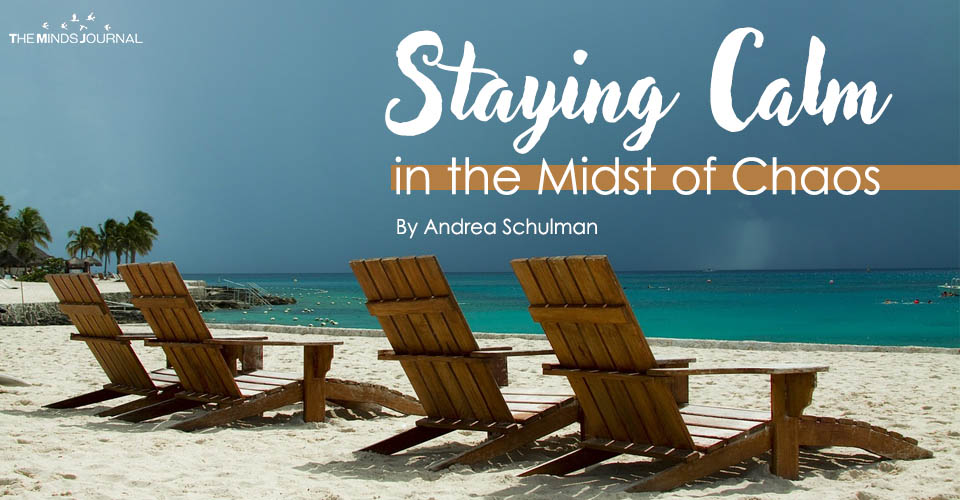Staying calm in the midst of chaos is the most advantageous move you can make.
You may or may not know that I live in Palm Bay, Florida. It’s a coastal town that borders the Atlantic ocean.
As a result, I have a bit of experience in preparing for life’s hurricanes (quite literally!).
And each time a hurricane rolls into town, I become even more aware of energy exchange and the importance of staying calm.
Ultimately, how we react to situations translates into our reality. Freaking out causes more accidents, stressors and problems.
Staying calm allows us to prepare mindfully and deliberately without distraction.
Read How to be Patient – Staying Calm Under Pressure
As a Law of Attraction coach and someone who is pretty “mellow” most of the time, even I can get swept up in the chaos if I’m not focused on keeping myself balanced. The preparation for Hurricane Irma has been a reminder of this to me this week.
Driving around my town the past couple of days I’ve seen quite a few car accidents and people running into other problems and conflicts. My thoughts? Stress from the hurricane (which isn’t here yet) is leading some people to real-time problems and dangers in the present moment.
So today, I’d like to share some things I’ve come to learn about dealing with collective fear and panic. Should you ever find yourself in the path of potential danger, I hope these lessons I’ve learned will be helpful to you.
Lesson 1: Know the difference between YOUR fear and THEIR fear
Many of us are highly intuitive and empathic. This is a gift, as it helps us understand each other quite well!
However, in the face of a “threat,” you will often come to notice that your fear meter can get triggered to a higher-than-usual level, simply by being around groups of fearful people.
For example, in preparing for a hurricane you may find yourself at the grocery store picking up supplies like water and bread.
Circling the store you may notice that your heart-rate and excitement level start to elevate, as you pick up on the fear generated from the collective group around you.
Bearing witness to other people racing around, their concerned faces and fearful voice tones can alert your empathic senses to the anxiety pulsing through the collective.
If we aren’t mindful of this, we can easily take on other people’s fear as our own.
So in situations like these, I’ve found it’s quite helpful for me to stay grounded in public. Perhaps pop in some earbuds with some soothing music or do some slow deep breathing.
Walk slower, rather than faster. Set the pace for being calm rather than getting sucked into the tide of panic.
And if need be, take a break from the public. Sometimes it’s best to remember if the disaster is still off in the distance you have time to relax. Take a nap, meditate or do something fun for a little bit.
Lesson 2: Remember, you only create from the NOW
Here’s another thing that is always very helpful for me to remember: Reality is constructed now, and only now.
When we try to “figure things out” too much we play into our anxieties and worries. This causes our vibrational energy to dip and puts us at risk for more real-time problems like I mentioned above.
If a threat isn’t literally at your doorstep right this very minute, then it hasn’t yet been created to be at your doorstep. Anything can still happen, including a favorable outcome.
By obsessively planning and replanning and discussing your possible strategies at length, you start playing the “worry game.”
So, when a threat appears to be looming, here’s my rule of thumb:
Do what you know you need to do to feel safe in the NOW, and make your decisions based on real-time feedback.
In other words, if it feels like NOW is a good time to stock up and prepare, do it. If it feels like NOW is the time to prepare for an evacuation, do it.
However, if you aren’t sure yet whether or not it is the right time to evacuate, relax. It isn’t time to figure it out then. Give yourself permission to make the decision when it needs to be made.Speculating when you still feel quite uncertain on which route to take will only cause greater anxiety.
Additionally when the moment to decide is NOW, do your best to make your plans based on this important question: “which direction brings me more relief?”
Do you feel more relieved with the idea of staying put, or do you feel more relieved with the idea of leaving? Trust your feelings and your gut, they will steer you properly if you listen to them. Jim Cantore does his best to help, but he’s got nothing on your intuition when it comes to guiding your own life.
Avoid making decisions based on what other people think or believe. They need to follow their guidance, but it is equally important that you follow yours!
If you continually make decisions based on what feels right to you in the NOW you will be guided to a reality that feels right. That’s how the LOA works.
Ultimately, you just don’t know if an “impending threat” is really a danger to you until it comes knocking. Staying the course with your decision-making will put you on the best trajectory to align with a reality that is safest for you.
Lesson 3: Clear out your calendar if possible.
Blazing forward in an attempt to be superman or superwoman and get everything in your regular life accomplished in addition to your preparations will likely cause overwhelm.
Of course, if you’re having an easy week, no problem! But if you suddenly find yourself in a situation you feel you must prepare for, it can be helpful to dial back on the productivity to keep your energy balanced.
In other words, if you have some appointments you can cancel or reschedule, why not do them later at a better time? If you have a project you were hoping to complete right now, why not complete it later when you have better clarity and focus?
If you have the luxury of taking a day off from work, why not use it now?
Give yourself the freedom to detach from the productivity grind. This will allow your more time for rest and relaxation, which you may be in need of if a threat or danger has you feeling tense or worked up.
Lesson 4: Make self-care a top priority.
I’ve noticed over the years that when life’s hurricanes approach, many of us often revert into self-soothing (but destructive) behaviors.
Suddenly, we start overindulging in our vices and addictions in an attempt to self-soothe. This may be temporarily relaxing but often leaves us feeling worse in the aftermath.
I’ve found that when a hurricane is rolling in, it has been helpful to me to try to eat foods I think are good for me, to allow myself plenty of time to sleep and to take care of my body.
This isn’t to say there are hard and fast rules on what you should eat or how you should behave. Rather, simply to ask yourself: how could I treat my body in a more self-loving way right now?
Taking care of your body during times of “crisis” will help you establish a more positive state of mind.
Read The Importance of Rest In Our Physical, Spiritual and Emotional Health
Lesson 5: Share the love.
Now, if you make a habit of each of the things above, it’s likely you’ll find yourself staying calm despite the chaos.
If you find this to be the case, share the love!
The people around you who are scared and stressed are doing the best they can. Even if they’re driving like crazy people, acting erratic or behaving “inappropriately,” they can’t really be held responsible right now. Fear makes people do crazy things.
So if you find yourself in a fairly balanced place bearing witness to someone who is having a harder time than you, share good vibes with them. Offer to help them, hold a door for them or let them past you.
Smile at them, or simply offer a positive thought to them silently in your own mind.
While the fear of the collective has the opportunity to “catch you,” so does your positive energy have the opportunity to “catch them.” Radiating love and compassion to the people around you can make a huge difference.
Alright, well that was a lengthy article for me, but I hope you enjoyed it! Thanks so much for reading, and if you have any thoughts on this you’d care to share please comment below.
Sending my love and peace to anyone out there who could use it.
XO, Andrea
Law of Attraction Educator









Leave a Reply
You must be logged in to post a comment.